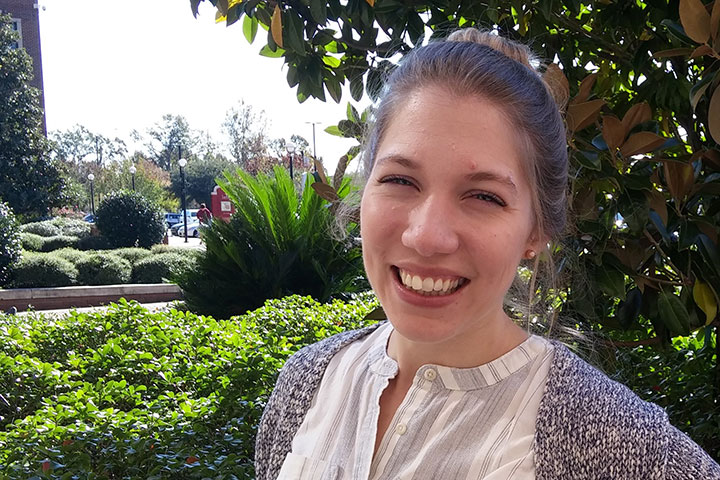
Preparing for our own death is a difficult task, one that can provoke debilitating sorrow and dismay. While most of us prefer to avoid thinking about death, FSU College of Social Work doctoral candidate Stephanie Grace Prost’s has produced award-winning research on the topic.
Prost recently received the Group for the Advancement of Doctoral Education in Social Work’s (GADE) 2017 Student Award for Social Work Research for the study, “Development and Validation of the Hospice Professionals’ Understanding of Preparatory Grief Scale,” published in the journal Research on Social Work Practice in 2016.
The recognition is provided to a doctoral student or a group of doctoral students whose in-press or published scholarship advances scientific inquiry in social work or social welfare.
Prost’s instrument validation study was conducted under the supervision of Neil Abell, FSU professor of social work. She worked alongside Abell over the course of two semesters to develop and validate a measure capable of assessing hospice professionals’ understanding of preparatory grief.
“Preparatory grief is understood as the loss-related reaction that individuals experience as they prepare for their own death,” Prost said. “It is critical that hospice professionals and other healthcare service providers are capable of distinguishing between adaptive and maladaptive reactions to impending death to assure timely and targeted intervention.”
Preparatory grief encompasses those loss-related, adaptive reactions to impending death. These reactions are fleeting responses with few negative consequences on an individual’s quality of life, such as brief periods of sadness or withdrawal from previously enjoyed friends, family or activities. Maladaptive reactions, in contrast, reflect sustained, negative consequences on an individual’s quality of life.
She noted that previous scholars’ findings have illustrated that maladaptive reactions may manifest as prolonged depression or suicidal behaviors if unmanaged. The measure includes a list of both adaptive and maladaptive reactions and asks hospice professionals including social workers, registered nurses and physicians to identify how true or false such reactions are for most patients. Prost went on to complete the validation study with the support of the Florida Hospice and Palliative Care Association and the Louisiana-Mississippi Hospice and Palliative Care Organization.
Prost hopes the measure will be used as a supplement to continuing education curriculums for hospice professionals and as a tool to foster discussion related to preparatory grief and other psychosocial correlates of terminal illness.
In January, Prost received a certificate and $1,500 award at the Doctoral Student Award Breakfast held at the annual GADE Reception at the 2017 Society for Social Work and Research in New Orleans, La.
“I believe that this award is a concrete illustration that doctoral student research is meaningful and has the capability to affect social work clients and communities,” Prost said. “Receiving this award is significant to my research goals as this particular piece is one part of a larger agenda — one aimed at enhancing quality of life for offenders and forensic service providers in criminal justice settings. I am also elated to have received this award, knowing that it was made possible by the unwavering support of faculty, community organizations and service providers.”
Prost’s research has focused on the intersection of social work, healthcare and criminal justice. This study has been critical to informing her dissertation research, which examines the strengths of peer-caregiving in acute, skilled-nursing and end-of-life settings within the Louisiana Department of Public Safety and Corrections. Prost also hopes that the findings of her dissertation will shape future investigations to develop, implement and evaluate interventions to enhance effective correctional healthcare service provision.
The Group for the Advancement of Doctoral Education in Social Work (GADE) was established over 25 years ago to provide a forum for sharing ideas and strategies among doctoral programs in social work, and for strengthening efforts at enhancing doctoral education. The membership, comprised of directors of established social work and social welfare doctoral programs located in accredited universities, has established three student awards in hopes of advancing social work scholarship, teaching and service — three principal areas in which full-time professors are typically engaged as faculty members. These awards reflect a commitment to bring visibility to our greatest resource, our students, who provide us with professional purpose and continuously offer us new ways to think and grow. For more information, visit: http://www.gadephd.org/.




